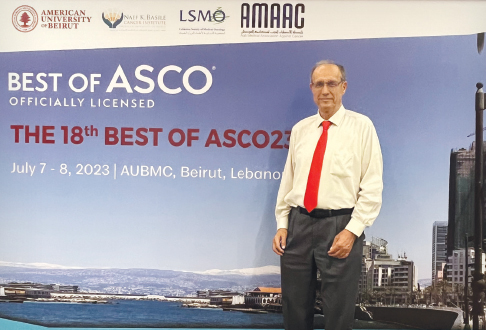Preparing and running a medical conference is usually a complex but rewarding mission. It is a demanding job that is typically done voluntarily by physicians and educators who are dedicated to professional and community service; advancement of research and education; as well as the dissemination of new medical knowledge, recommendations, and guidelines to ultimately serve patients in their communities, countries, and worldwide.
People who attend those meetings are also dedicated and eager to advance their knowledge, develop better research projects, and improve the care of their patients. They spend their valuable time and money to participate in meetings. They also seek to fulfill requirements of continuing medical education for the purpose of licensure renewal and institutional hospital privileges.
Time and Effort
As to what goes on while setting up a meeting, many people would be surprised to realize how much time and effort it takes to organize meetings, especially the Best of ASCO (BOA) meetings. Preparation of major medical meetings usually starts about 1 year in advance; however, that is not possible when it comes to organizing BOA.
My own experience with BOA started about 18 years ago. In 2004–2005, when ASCO started the Best of ASCO programs in the United States, I was a member of ASCO’s International Affairs Committee. We quickly requested approval and licensing of similar meetings overseas. My home country of Lebanon was among the first three countries that started holding international BOA meetings, along with Japan and Mexico.
I had started participating in post-ASCO meetings when I was a fellow at St. Luke’s Roosevelt Hospital Center in New York, and that was after I attended my first ASCO Annual Meeting. Upon returning from the Annual Meeting, I chose the most important abstracts and topics and presented summaries to the Hematology Oncology Division at St. Luke’s. After I joined the American University of Beirut Medical Center, I founded the Lebanese Society of Medical Oncology in 1997 and started ASCO Highlights meetings that evolved into Best of ASCO national and regional meetings in 2006.

Although we usually set a date for BOA to be held in late June or early July, we cannot start real preparations until we have signed an agreement with ASCO’s BOA licensing department. Unlike other meetings where advance planning is possible, here we have to wait until after abstracts have been selected for presentation at the ASCO Annual Meeting in Chicago. The BOA committee then selects abstracts for the BOA meetings and forwards the titles to us, usually during April or May, and it is only then that we can start contacting and inviting potential speakers.
Many times, we even have to wait until after we see the results of abstracts at ASCO to choose around 30 to 40 of the most important and most pertinent abstracts from the 60 to 70 that the ASCO BOA committee had selected. Because of the short notice for speaker invitations, it is helpful to have a good network of investigators as friends and a small BOA planning committee of well-connected experts.
Meeting Promotion
We promote our BOA meeting as a great opportunity for junior oncologists and fellows-in-training to learn how advances are made via original research presentations. They have the opportunity to hear about the backgrounds, unmet needs, methods, and results of each research and clinical trial abstract; to listen to how investigators arrived at their conclusions; and to hear those conclusions discussed by expert presenters. We ask our international, regional, and national speakers to present ASCO slides as they appeared at the Annual Meeting in Chicago, to avoid any critique during the abstract presentation. They are allowed to add their opinion in one or two slides that may be included as non–Best of ASCO slides, and they can give their opinions during discussions. This is what has made our BOA meeting very successful and attractive to attendees from the entire Middle Eastern region.
During the COVID-19 pandemic, we adopted the virtual attendance option, which allows us to invite many international investigators without having them worry about time away from their busy daily schedules. Since the resolution of the pandemic and the advent of a deep financial crisis in Lebanon, we have embraced the hybrid option, which allows us to continue to invite international investigators—many of them ASCO Annual Meeting presenters—while saving travel and hotel costs. Participants and speakers from Lebanon, and those who bear their own costs, will attend in person.
Overcoming Obstacles
Generally, nothing successful happens without difficulties and obstacles. In addition to setting up the usual meeting requirements, we get to spend long hours arranging (and fixing) schedules to accommodate sessions with speakers from different world time zones. Over the few weeks after ASCO and before BOA, we’ve had to change the timing of sessions several times to accommodate all speakers.
One great thing about BOA—as compared to the previous ASCO Highlights meetings that many of us used to hold at our own institutions—is ASCO provides us with PowerPoint slides soon after the ASCO Annual Meeting ends. That is a great relief for us and for the speakers, especially when they are invited on short notice.
This year, at BOA 2023 Lebanon, we decided to change the format and maximize the benefit for attendees by limiting the number of abstracts chosen to only the most pertinent studies. This approach gives session chairs and moderators ample time as panelist discussants, with the aim of allowing a rich discussion and coming up with take-home messages and recommendations.
To every one of our worldwide colleagues who prepare Best of ASCO meetings, you deserve a big thank you and a large attendance!
Disclaimer: This commentary represents the views of the author and may not necessarily reflect the views of ASCO or The ASCO Post.

